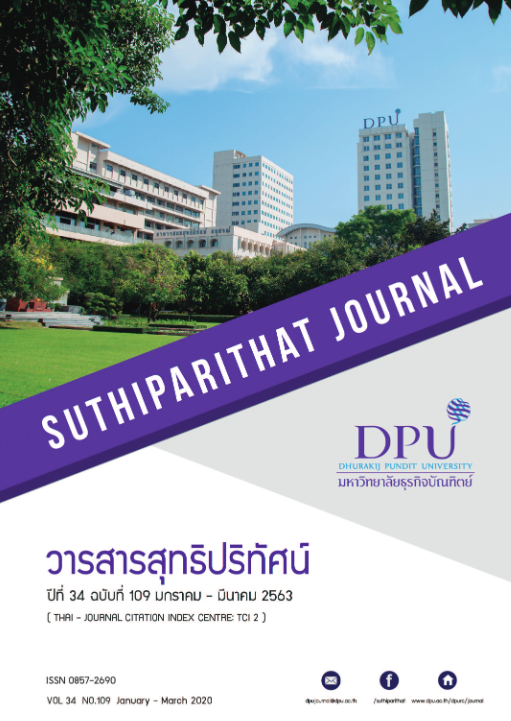ปัจจัยที่มีอิทธิพลต่อการกำหนดค่าธรรมเนียมการสอบบัญชี
คำสำคัญ:
ค่าธรรมเนียมการสอบบัญชี, การสอบบัญชี, การกำกับดูแลกิจการบทคัดย่อ
การสอบบัญชีเป็นเครื่องมือหนึ่งที่ช่วยในการตรวจข้อมูลการจัดทำรายงานทางการเงิน เพื่อสร้างความเชื่อมั่นให้แก่ผู้มีส่วนได้เสียต่างๆ ปัจจุบันมีผู้สอบบัญชีรับอนุญาตเป็นจำนวนมากเกิดปัญหาทางด้านการแข่งขันเพื่อรับงานสอบบัญชี ซึ่งผลกระทบต่อคุณภาพในการตรวจสอบบัญชีนำไปสู่การพิจารณาทบทวนประเด็นบทบาทซ้ำซ้อนเหล่านี้ เพื่อแสดงให้ผู้ที่มีส่วนได้เสียเห็นถึงความสำคัญของวิชาชีพสอบบัญชี และแต่งตั้งผู้สอบบัญชีโดยเน้นที่คุณภาพของผู้สอบบัญชีมากกว่าการพิจารณาเพียงแค่ค่าธรรมเนียมในการสอบบัญชีแต่เพียงอย่างเดียว งานวิจัยครั้งนี้จึงมีวัตถุประสงค์เพื่อศึกษาปัจจัยที่มีอิทธิพลต่อการกำหนดค่าธรรมเนียมการสอบบัญชีของบริษัทที่จดทะเบียนในตลาดหลักทรัพย์แห่งประเทศไทย (SET) ในการวิจัยครั้งนี้ใช้การวิเคราะห์เนื้อหา (Content Analysis) จากรายงานประจำปี รวมถึงการวิเคราะห์ความสัมพันธ์ระหว่างตัวแปรโดยใช้การวิเคราะห์การถดถอยพหุคูณ ผลการศึกษาพบว่าปัจจัยขนาดของบริษัท จำนวนบริษัทย่อย ความถี่ในการประชุมของคณะกรรมการตรวจสอบ และค่าธรรมเนียมสำหรับงานบริการอื่นที่นอกเหนือจากค่าสอบบัญชีมีอิทธิพลในทางบวกต่อการกำหนดค่าธรรมเนียมการสอบบัญชี ส่วนเพศของประธานเจ้าหน้าที่บริหารมีอิทธิพลในทางลบต่อการกำหนดค่าธรรมเนียมการสอบบัญชี แต่ปัจจัยอื่นได้แก่ ความเสี่ยงของบริษัท ความสามารถในการทำกำไรของบริษัท ความเป็นอิสระและความรู้ความเชี่ยวชาญของคณะกรรมการตรวจสอบ อายุและประสบการณ์ทำงานของประธานเจ้าหน้าที่บริหารไม่มีอิทธิพลต่อการกำหนดค่าธรรมเนียมการสอบบัญชี
เอกสารอ้างอิง
กาญจนา ประกอบแสง, และพัทธนันท์ เพชรเชิดชู. (2560). กลไกการกำกับดูแลกิจการ ความสัมพันธ์ทางการเมืองกับคุณภาพกำไร. วารสารวิชาชีพบัญชี, 31(99), 1-15.
Abbott, L. J., Parker, S., Peters, G. F., & Raghunandan, K. (2003a). The association between audit committee characteristics and audit fees. Auditing: A Journal of Practice & Theory, 22(2), 17-32.
Abbott, L. J., Parker, S., Peters, G. F., & Raghunandan, K. (2003b). An empirical investigation of audit fees, nonaudit fees, and audit committees. Contemporary Accounting Research, 20(2), 215-234.
Brick, I. E., Palmon, O., & Wald, J. K. (2006). CEO compensation, director compensation, and firm performance: Evidence of cronyism?. Journal of Corporate Finance, 12(3), 403-423.
Bushman, R. M., & Smith, A. J. (2001). Financial accounting information and corporate governance. Journal of accounting and Economics, 32(1), 237-333.
Carcello, J. V., & Neal, T. L. (2000). Audit committee composition and auditor reporting. The Accounting Review, 75(4), 453-467.
Carcello, J. V., Hermanson, D. R., & Neal, T. L. (2002). Disclosures in audit committee charters and reports. Accounting Horizons, 16(4), 291-304.
Chan, P., Ezzamel, M., & Gwilliam, D. (1993). Determinants of audit fees for quoted UK companies. Journal of Business Finance & Accounting, 20(6), 765-786.
Choi, J. H., Kim, C., Kim, J. B., & Zang, Y. (2010). Audit office size, audit quality, and audit pricing. Auditing: A Journal of Practice & Theory, 29(1), 73-97.
Dee, C. C., Lulseged, A. A., & Nowlin, T. S. (2002). Earnings quality and auditor independence: an examination using non-audit fee data. Available at SSRN 304185.
Francis, J. R., & Simon, D. T. (1987). A test of audit pricing in the small-client segment of the US audit market. Accounting Review, 62(1), 145-157.
Francis, J. R., & Stokes, D. J. (1986). Audit prices, product differentiation, and scale economies: further evidence from the Australian market. Journal of Accounting Research, 24(2), 383-393.
Gonthier-Besacier, N., & Schatt, A. (2007). Determinants of audit fees for French quoted firms. Managerial Auditing Journal, 22(2), 139-160.
Gul, F. A., C. J. P. Chen, & J. S. L. Tsui. (2003). Discretionary accounting accruals, managers’ incentives, and audit fees. Contemporary Accounting Research, 20(3), 441-464.
Hay, D. C., Knechel, W. R., & Wong, N. (2006). Audit fees: A meta-analysis of the effect of supply and demand attributes. Contemporary Accounting Research, 23(1), 141-191.
Joshi, P. L., & Al-Bastaki, H. (2000). Determinants of audit fees: Evidence from the companies listed in Bahrain. International Journal of Auditing, 4(2), 129-138.
Mitra, S., Hossain, M., & Deis, D. R. (2007). The empirical relationship between ownership characteristics and audit fees. Review of Quantitative Finance and Accounting, 28(3), 257-285.
Naser, K., & Nuseibeh, R. (2008). Determinants of audit fees: Empirical evidence from an emerging economy. International Journal of Commerce and Management, 17(3), 239-254.
Palmrose, Z. V. (1986a). Audit fees and auditor size: Further evidence. Journal of Accounting Research, 24(1), 97-110.
Palmrose, Z. V. (1988). 1987 Competitive manuscript co-winner: An analysis of auditor litigation and audit service quality. Accounting review, 63(1), 55-73.
Peel, M. J., & Clatworthy, M. A. (2001). The relationship between governance structure and audit fees pre-Cadbury: Some empirical findings. Corporate Governance: An International Review, 9(4), 286-297
ดาวน์โหลด
เผยแพร่แล้ว
รูปแบบการอ้างอิง
ฉบับ
ประเภทบทความ
สัญญาอนุญาต
เนื้อหาและข้อมูลในบทความที่ลงตีพิมพ์ในวารสารสุทธิปริทัศน์ ถือเป็นข้อคิดเห็นและความรับผิดชอบของผู้เขียนบทความโดยตรงซึ่งกองบรรณาธิการวารสาร ไม่จำเป็นต้องเห็นด้วย หรือร่วมรับผิดชอบใด ๆ
บทความ ข้อมูล เนื้อหา รูปภาพ ฯลฯ ที่ได้รับการตีพิมพ์ในวารสารสุทธิปริทัศน์ ถือเป็นลิขสิทธิ์ของวารสารสุทธิปริทัศน์หากบุคคลหรือหน่วยงานใดต้องการนำทั้งหมดหรือส่วนหนึ่งส่วนใดไปเผยแพร่ต่อหรือเพื่อกระทำการใด ๆ จะต้องได้รับอนุญาตเป็นลายลักษณ์อักษรจากวารสารสุทธิปริทัศน์ก่อนเท่านั้น







